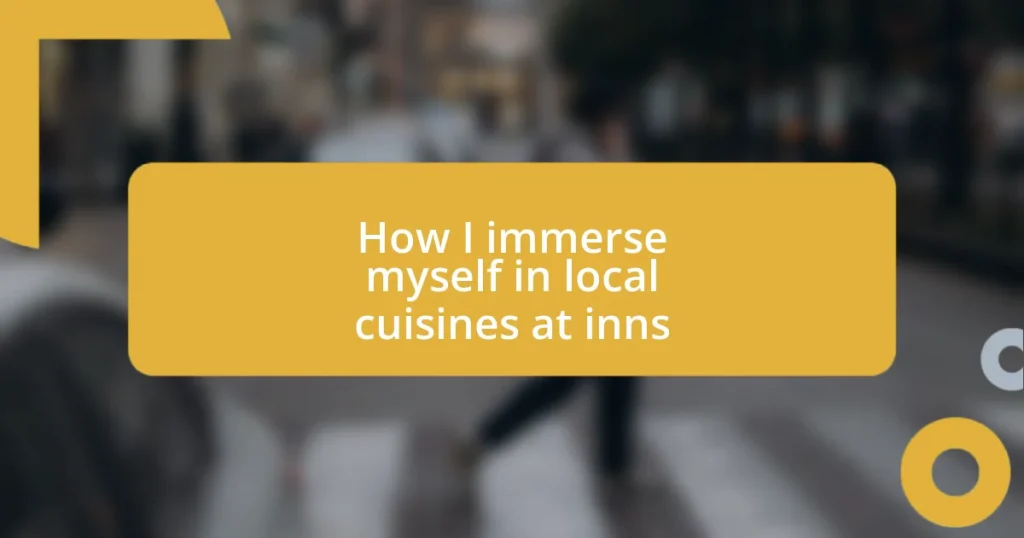Key takeaways:
- Experiencing local cuisine deepens cultural connections and evokes nostalgia, enriching travel memories.
- Choosing the right inns enhances culinary adventures by providing authentic regional dishes and personalized experiences.
- Engaging with locals, participating in cooking classes, and documenting culinary experiences elevate the journey by fostering connections and appreciation for cultural traditions.

Experiencing local cuisine benefits
One of the most enriching aspects of immersing myself in local cuisine is the chance to connect with the culture on a deeper level. I recall savoring a homemade stew at a quaint inn in rural Ireland, where the innkeeper shared stories about the origins of each ingredient. Isn’t it fascinating how food carries history?
Moreover, experiencing regional dishes often opens up opportunities for meaningful interactions with locals. During my travels in Thailand, I found myself invited to join a cooking class after ordering a traditional dish at a family-run restaurant. That simple bowl of Pad Thai led to a memorable day spent learning family recipes, deepening my appreciation for their culinary traditions.
Finally, tasting local specialties often evokes strong emotions and nostalgia, reminding me of the warmth of shared meals with loved ones. For instance, trying a warm, spiced cake in a cozy inn always takes me back to my grandmother’s kitchen during holiday gatherings. Isn’t it beautiful how food can evoke such powerful memories while creating new ones?

Choosing the right inns
Choosing the right inn can significantly enhance your culinary adventures. I remember arriving at an inn in Tuscany, where the inviting aroma of fresh pasta filled the air. The inn’s reputation for homemade meals was what drew me there, and it certainly did not disappoint.
Understanding the types of cuisine offered by an inn can also guide your choice. For instance, I once chose a seaside inn in Maine that specialized in seafood dishes. Slurping down the chowder prepared with fish caught that morning was an experience that connected me with the locale in a way that a generic meal simply couldn’t.
Lastly, don’t forget to check reviews, as they often reveal hidden gems or local favorites. I once found an inn in New Orleans via a travel blog, and it led me to the most authentic gumbo I’ve ever tasted, crafted by an innkeeper whose family recipe was passed down through generations. Those firsthand accounts can guide your decision exceptionally well.
| Factor | Consideration |
|---|---|
| Location | Choose inns where local specialties are available, especially in culturally rich areas. |
| Reviews | Look for recommendations that highlight the authenticity of the cuisine. |
| Amenities | Consider inns that offer cooking classes or food-related experiences for deeper immersion. |

Researching regional specialties
When researching regional specialties, I often dive into local culinary traditions before embarking on my journey. I remember planning a trip to the Basque Country, where I eagerly searched for key dishes like pintxos and bacalao a la vizcaína. Discovering these specialties helped shape my itinerary, ensuring I visited local eateries known for authentic preparations.
- Look for regional blogs or food-focused websites that highlight local dishes.
- Engage with social media groups dedicated to food exploration in the area.
- Consult travel guides that mention popular dishes or cooking classes.
- Explore local markets once you arrive to see what ingredients are fresh and in season.
I’ve found that engaging with locals is an invaluable resource. On a trip to Mexico, I chatted with a street vendor who recommended trying mole poblano, a dish I hadn’t encountered yet. The vendor, excited to share his culture, explained the intricacies of each ingredient, making my culinary adventure all the more meaningful. This personal connection not only enriched my understanding of the dish, but also fostered a deeper appreciation for the culinary landscape I was exploring.

Engaging with innkeepers
Engaging with innkeepers can truly transform your culinary experience. I’ve found that these individuals often hold a wealth of knowledge about local ingredients and cooking techniques. During a stay at a cozy inn in the countryside, the innkeeper invited me into the kitchen to share her secrets for preparing a classic roast. It felt like stepping into her home, a warm and inviting space filled with stories behind each recipe.
What I love most is how innkeepers can tailor your dining experience. I recall a charming inn in Ireland where the owner took the time to understand my dietary preferences. He crafted a meal around fresh vegetables from his garden, and even shared the story of how he came to grow them. This personalized touch not only made the dish memorable but also fostered an emotional connection to the meal itself.
Have you ever thought about how these interactions can enhance your travel experience? Connecting with innkeepers often yields recommendations for local markets or hidden gems that aren’t in guidebooks. After a delightful conversation in a quaint inn in Maine, I stumbled upon a little bakery down the road that served the best blueberry pie I’ve ever tasted. Engaging with innkeepers opens doors to new culinary adventures and creates lasting memories.

Participating in cooking classes
Participating in cooking classes has been one of my favorite ways to dive deep into local cuisines. I remember a lively class in Tuscany where we learned to make handmade pasta. The hands-on experience was incredible—I felt a connection to the region’s culinary heritage as we mixed flour and eggs, laughing at our attempts to roll the dough perfectly. Have you ever noticed how food not only satisfies hunger but also bridges cultural divides? For me, every dish prepared in that class told a story.
The instructors in these classes often share personal anecdotes that bring the recipes to life. In a cooking workshop in Thailand, the chef recounted her grandmother’s traditional recipes, igniting a sense of nostalgia and respect for her culture. Hearing her excitement while demonstrating how to balance sweet and spicy flavors transformed the whole experience into something memorable. Each ingredient became a part of a greater narrative, and I found myself savoring the process even more than the final dish.
I always recommend seeking out local classes wherever you travel. Not only do they offer practical skills, but they also allow you to meet fellow food lovers. During a class in Morocco, I bonded with travelers from different backgrounds, all eager to learn the intricacies of tagine cooking. We shared meals after the class, discussing our different travel experiences, which turned a simple cooking session into a vibrant social event. Isn’t it fascinating how food can bring people from varied walks of life together, creating connections that last long after the dishes are cleaned away?

Exploring local markets
Exploring local markets has always been a highlight of my culinary adventures. Recently, I wandered through a bustling market in Barcelona, the vibrant colors of ripe fruits and vegetables tantalizing my senses. As I sampled olives from a friendly vendor, I felt a surge of joy that only fresh, local produce can bring. Isn’t there something special about tasting a place through its food?
One experience that stands out took place at a small market in Thailand. Surrounded by the scents of lemongrass and coconut, I struck up a conversation with a lady selling freshly made spring rolls. She shared her recipe with me, demonstrating the delicate balance of flavors while her laughter filled the air. That simple interaction made me realize that markets are not just about shopping; they’re about discovering stories behind the food that shape a culture.
I’ve also found markets to be an excellent way to meet locals and learn about traditional dishes. During a visit to a farmer’s market in Provence, I chatted with an elderly gentleman who passionately spoke about the herbs he grew. His stories opened my eyes to the importance of seasonality in cooking. Have you ever noticed how certain ingredients can evoke memories of a place? Those fragrant herbs are now forever linked to my experience in Provence, enriching my understanding of its cuisine.

Documenting culinary experiences
Documenting my culinary experiences has become a cherished ritual during my travels. I often keep a dedicated journal, where I jot down not just recipes but the emotions tied to each meal. I vividly recall writing about a heartwarming dinner in a rustic French inn, where the owner served a fragrant boeuf bourguignon. In that moment, the rich aroma enveloped me, and I couldn’t help but feel the love infused in each bite. Isn’t it amazing how food can capture such profound memories?
I also embrace photography as a way to document these culinary moments. Capturing the vibrant colors of dishes or the warm smiles of chefs adds a personal touch to my travel stories. I remember snapping a photo of a lovely family gathering in an Italian agriturismo, where everyone was savoring homemade lasagna. That image marked not just a meal but a celebration of togetherness, reminding me that sharing food creates bonds that transcend language and culture. Do you think photos can transport us back to a moment in time?
Another fascinating method I’ve adopted is recording interviews with chefs I meet along the way. Each conversation unravels the passion and history behind their cooking. During my stay at a cozy inn in Japan, I had the pleasure of speaking with a sushi chef who revealed the meticulous process of sourcing fish. His eyes sparkled with pride as he shared secrets of preparation, and I felt my appreciation for sushi deepen. Isn’t it incredible how these shared stories can enrich our culinary journey, turning a simple dish into a cultural experience?














